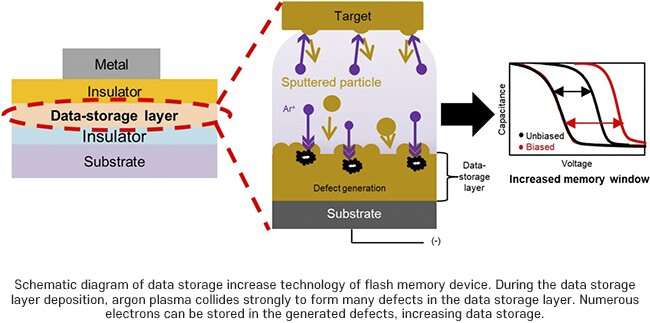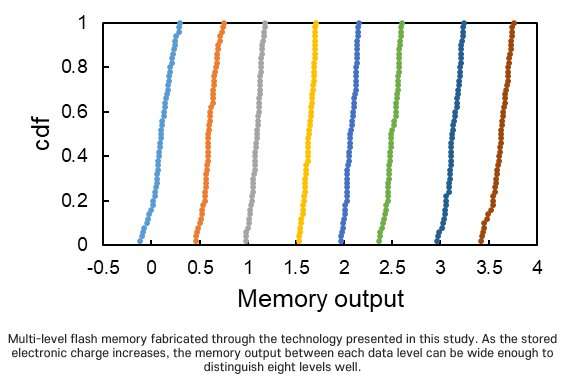Boosting memory performance with strong ion bombardment

Recently, researchers have developed new technology that dramatically improves the performance of flash memory by a strong ion bombardment process. This memory platform can reliably express multiple data in a single device, rendering it applicable for future neuromorphic computing as well as increasing memory capacity.
POSTECH professor Yoonyoung Chung (Department of Electrical Engineering and Department of Semiconductor Engineering) and Ph.D. candidate Seongmin Park (Department of Electrical Engineering), in joint research with Samsung Electronics, have developed a flash memory with increased data storage by intentionally generating defects.
As artificial intelligence technology advances, developing a novel semiconductor device optimized for the neural network with multilevel data is required. New materials and devices have been developed as neuromorphic devices but have limitations in durability, scalability, and storage capacity compared to flash memory, which has been widely used as a storage device for various applications.
To overcome these issues, the research team implemented a strong plasma bombardment process during the deposition of the data-storage layer to generate artificial defect sites in a flash memory device. The researchers confirmed that more electrons can be stored in generated defects, dramatically increasing the amount of data storage compared to conventional flash memory.

A memory with multiple levels of data can be demonstrated when the electrons are gradually filled in the data storage layer in which many defects are generated. The multilevel flash memory developed in this study can reliably distinguish eight data levels.
The findings from the study are significant in that they can minimize the risk of developing a new semiconductor material or structure and, at the same time, significantly advance flash memory with excellent performance and scalability for AI applications. When applied to neuromorphic systems, inference accuracy and reliability are expected to be dramatically improved compared to conventional devices.
The study was recently published in Materials Today Nano.
CMOS-compatible 3-D ferroelectric memory with ultralow power and high speed
S. Park et al, Defect generation in a data-storage layer by strong ion bombardment for multilevel non-volatile memory applications, Materials Today Nano (2022). DOI: 10.1016/j.mtnano.2022.100226
Provided by
POSTECH
Citation:
Boosting memory performance with strong ion bombardment (2022, July 27)
retrieved 27 July 2022
from https://techxplore.com/news/2022-07-boosting-memory-strong-ion-bombardment.html
This document is subject to copyright. Apart from any fair dealing for the purpose of private study or research, no
part may be reproduced without the written permission. The content is provided for information purposes only.
For all the latest Technology News Click Here
For the latest news and updates, follow us on Google News.
